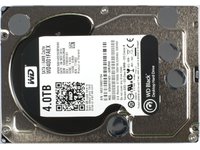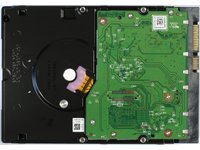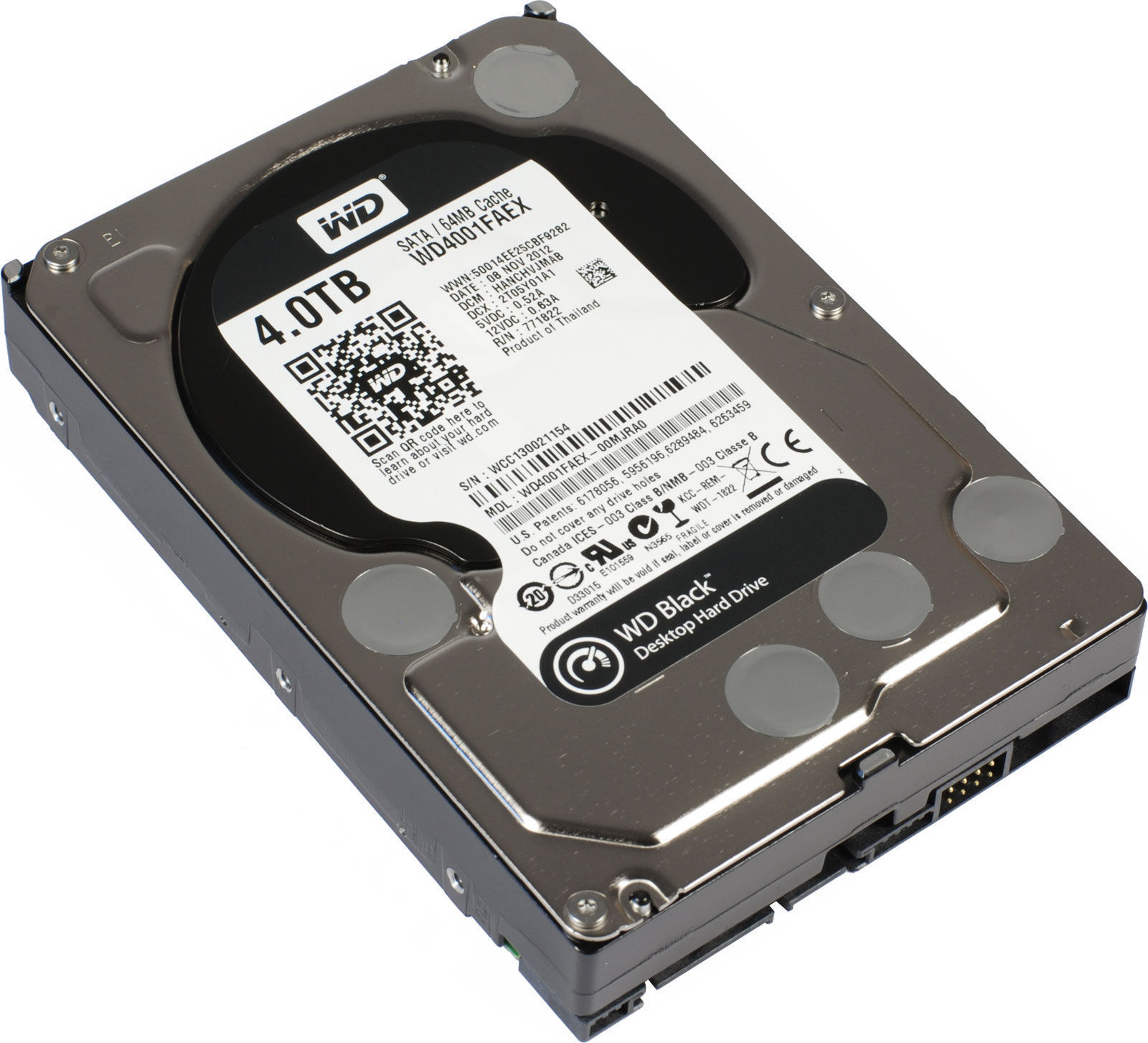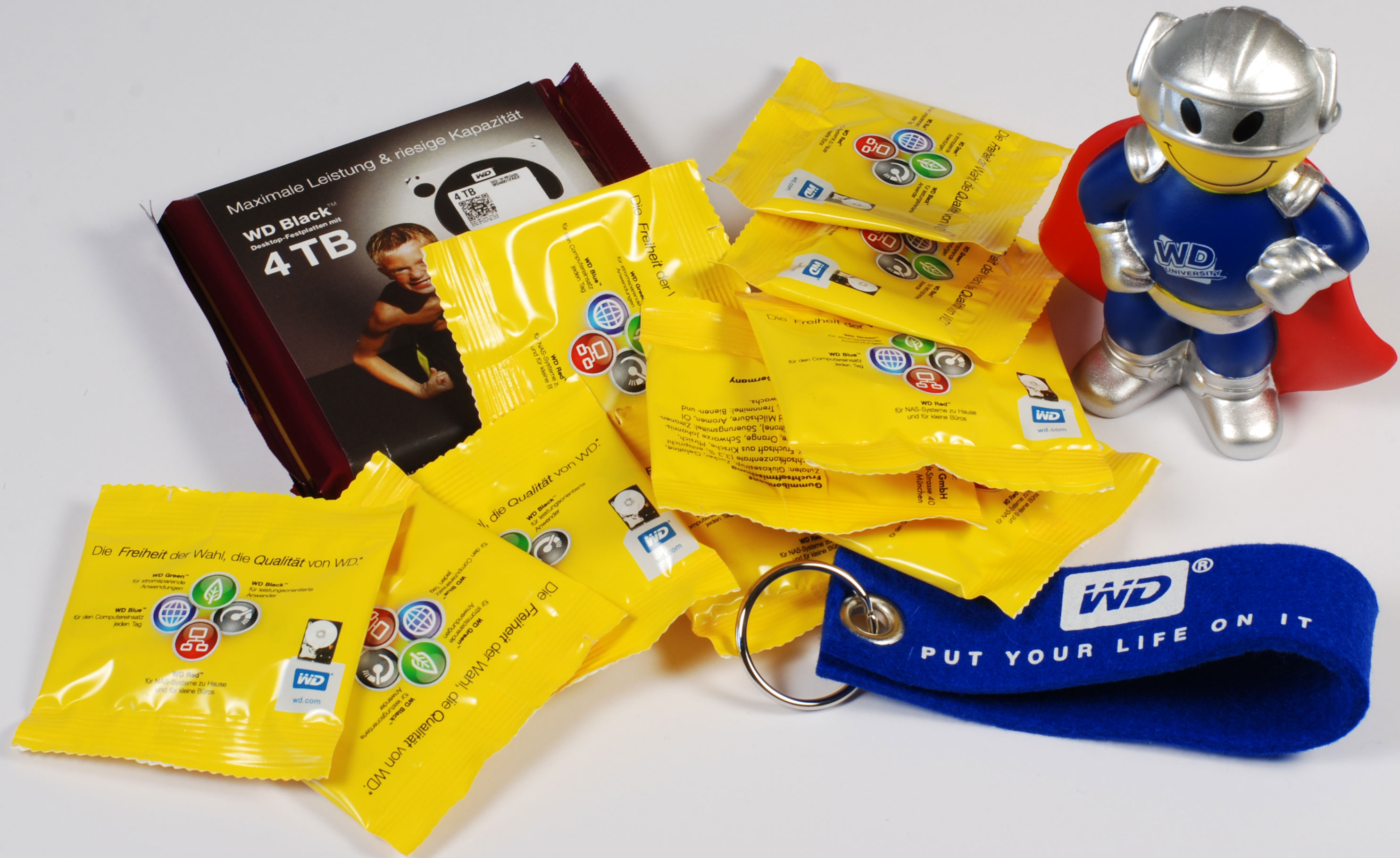Western Digital's 4 TB WD4001FAEX Review: Back In Black
Western Digital has a new 4 TB flagship. Its WD4001FAEX is part of the company’s Black family of performance-oriented drives. Spinning at 7,200 RPM, it might seem at home in a high-end desktop, but our numbers suggest it might fare better in a server.
Western Digital's Performance-Oriented 4 TB Hard Drive
Western Digital recently added a new model to its Black family of performance-oriented hard drives. The new disk, technically referred to as WD4001FAEX, sports 4 TB of space. It spins at 7,200 RPM, employs a 6 Gb/s SATA interface, and includes 64 MB of cache.
Although the company won't divulge how many platters this behemoth uses to hit its capacity ceiling, our benchmark/power data suggests the magic number is five. You can’t tell by simply looking at it; the drive is 26.1 mm-thick, just like many other 3 and 4 TB repositories.
As a general rule, the more capacity a hard drive hosts, the longer it takes to benchmark. Western Digital's WD4001FAEX is certainly no exception. It took us 19 hours of testing to get a complete picture of its performance. Fortunately, the company kept this in mind when it sent out samples, providing us with some much-needed sugar. It's too bad that you don't get chocolate as part of the disk's standard bundle. When you spend $330, a bare 4 TB hard drive is all you get.
Technical Specifications
| Manufacturer | Western Digital |
|---|---|
| Family | Black |
| Model Number | WD4001FAEX |
| Form Factor | 3.5" |
| Capacity | 4 TB |
| RPM | 7,200 |
| Other Capacities | 500 GB, 1 TB, 2 TB |
| Platters | Unknown |
| Cache | 64 MB |
| Interface | SATA 6Gb/s |
| Operating Temperature | 0-55° C |
| Power Consumption at Idle (Manufacturer's Specifications) | 8.1 W |
| Power Consumption at Idle (Measured) | 7.9 W |
| Maximum Allowable Shock Level (2 ms, read) | 65 G |


Benchmark System
| Benchmark System Hardware | |
|---|---|
| CPU | Intel Core i5-2500K (Sandy Bridge), Stepping D2, 32 nm, 4C/4T, 3.3 GHz Base Clock Rate, 3.7 GHz Maximum Turbo Boost, 4 x 256 KB L2 Cache, 6 MB Shared L3 Cache, HD Graphics 3000, 95 W TDP |
| Motherboard | Gigabyte Z68X-UD3H-B3, Revision: 0.2, Chipset: Intel Z68 Express, BIOS: F3 |
| RAM | 2 x 2 GB DDR3-1333, Corsair TR3X6G1600C8D |
| System SSD | Intel X25-M G1, 80 GB, Firmware 0701, SATA 3Gb/s |
| Benchmarked Hard Drive | Western Digital Black WD4001FAEX, 4 TB, 64 MB Cache, SATA 6Gb/s, 7,200 RPM |
| Controller | Intel PCH Z68 SATA 6 Gb/s |
| Power Supply | Seasonic X-760 760 W, SS-760KM Active PFC F3 |
| Benchmarks | |
| Benchmark Software | CrystalDiskMark 3.0.1 x64 h2benchw 3.16 PCMark 7 1.0.4 |
| I/O Benchmark Software | IOMeter 2006.07.27 Webserver Benchmark Database Benchmark Fileserver Benchmark Workstation Benchmark Streaming Reads Streaming Writes 4K Random Reads 4K Random Writes |
| System Software and Drivers | |
| Software and Drivers | Details |
| Operating System | Windows 7 x64 Ultimate SP1 |
| Intel INF | 9.2.0.1030 |
| Intel Rapid Storage Technology | 10.5.0.1026 |
Get Tom's Hardware's best news and in-depth reviews, straight to your inbox.
Current page: Western Digital's Performance-Oriented 4 TB Hard Drive
Next Page Benchmark Results: Data Throughput And Interface Bandwidth-
joytech22 ReplySo, who should buy Western Digital's WD4001FAEX? The company says its drive is meant for PC enthusiasts and professionals. But we can’t quite agree because Seagate's Barracuda is, quite simply, faster.
For enthusiasts, all we really want is space and lots of it. We fill it up fast, but we don't do anything super-intensive requiring a constant of 80+Mb/s over long durations.
For enthusiasts that do a lot of video editing using lots of tracks, sure it's a bit of a limitation but so is any one drive solution.
As for professionals, it just depends what they need it for.
A high-end workstation needing plenty of storage and speed just needs a RAID config containing a few of these babies. Or super-expensive high capacity SSD's...
All in all, I'm just saying it depends on your situation but generally you find people are happy with big drives regardless of speed (since all drives perform admirably nowdays anyway). -
mayankleoboy1 One thing i have never found a answer to : Is it worth defragmenting HDD's on modern systems, with Win7 and NTFS ?Reply
I do defragment my HDD, but subjectively i find no difference. And i have yet to find objective data. -
alidan mayankleoboy1One thing i have never found a answer to : Is it worth defragmenting HDD's on modern systems, with Win7 and NTFS ?I do defragment my HDD, but subjectively i find no difference. And i have yet to find objective data.Reply
it really depends.
if you dont have a boot specific drive, than defragmenting is kind of important.
if you do... than it doesn't tank system performance to not defrag.
really what kills a hdd performance is being a a boot drive and storage, as it can get so slammed with access that it drags the over all performance to sub mb levels.
what hurts a hdd on storage when its not a boot, is filling the damn thing up to the last mb.
generally, if you have a hdd and have enough space to defrag it without the program complaining (15-25% of the space remaining) you dont need to defrag. it helps, but you wont see the gains that you otherwise may see if you didnt have the space to defrag. -
avjguy2362 Before SSD's I used to use a 75 GB raptor and used O&O's defrag COMPLETE method on the OS and it made a substantial difference. O&O has multiple types of defrag: a quick version, a standard version and a "Complete" version that takes a long time because it moves the data to the other end of the drive and then puts all the files back in the order that they would most likely be read. It's unnecessary for data drives, but for the OS it made a big difference.Reply -
Chocolate? Since this about 4TB of storage, at first i thought i was looking at picture of a work out video for the hard drive junky, 10 condoms, WD happy mascot, and a rubber keychain all part of a harmless joke by WD.Reply
-
_Pez_ I prefer storage over extreme speed of SSD.Reply
Nice Review I liked more the hitachi perfomance, also those are better than the WDs' HDD I think WD is getting left behind about perfomance numbers, now I see in this review that the strong ones are Seagate and Hitachi.
My main PC has 14TB of storage; 4 seagate 3tb 2&2 in RAID 0, 2 seagate 1TB RAID 0 for OS, all of those are the newely Seagate models of 1TB per platter.
I do not see the need to spent on SSDs while there's the chance to get lots of storage and decent speeds, except for 4Kb transfers. -
Luay Seagate Barracuda 3TB is on three (1TBx3) platters so why not WD?Reply
Another issue I dislike about the WD Caviar blacks is the noise they make. How much does this update improve on this issue? -
abbadon_34 Not sure why WD is being secretive about the number of platters, it's always been standard info and I can't see a reason not to. It's nice to see 5 years warranties back, and not confined to enterprise or Raptor series. While nothing to exciting, it's nice to see a good solid hardware review.Reply -
hytecgowthaman 80mb per sec Ok how many hours to fill the hdd.Reply
5Year warranty is ok but we need data recovery warranty because (4tb) hdd fails no way to get the files.
so always use another 4tb for back up use.
another thing is how many hours take to recovery the files.

